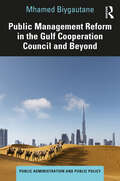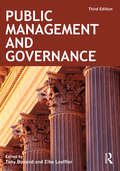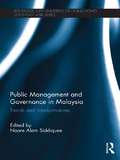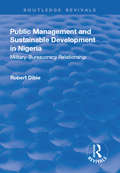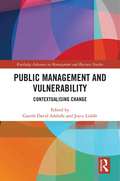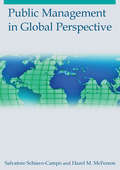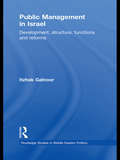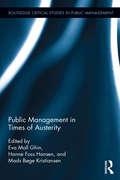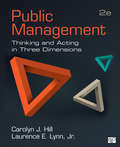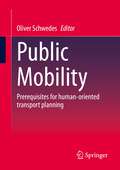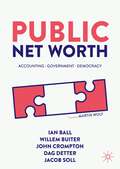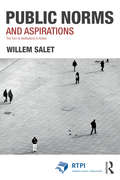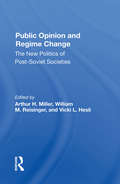- Table View
- List View
Public Management Reform in Turkey: The Impact of Europeanization and Beyond (Public Administration, Governance and Globalization #20)
by Fatih DemirThis book discusses the Europeanization of Turkish public administration since the early 2000s, offering an analysis of the transformation and basic features and problems of Turkish public administration in relation to the EU accession process.The book consists of six chapters and a conclusion. The first chapter sets the stage by evaluating the public administration reforms in Turkey from the perspective of Europeanization and the European Administrative Space (EAS). The second chapter discusses the administrative procedures based on the European Union’s Charter of Fundamental Rights, and explains the EU’s relationship with accountable government and democracy. The third and fourth chapters examine the steps taken to improve civic participation in decision-making processes, and assess local governance reforms in Turkey with reference to Europeanization processes and the “policy windows” approach developed by Kingdon. The next chapter addresses regionalization in Europe and its parallels in Turkey, especially in the context of the foundation of regional development agencies. Lastly, the book presents the reactions to the fragmentation of government envisaged by New Public Management (NPM) reforms and describes practices beyond fashioning an integrated administration. It also explores the transformation of the executive organ in terms of its change in status, in relation to other centers of political power. The conclusion provides an overview of the apparent oscillation of Turkish public administration in the 21st century, in terms of Europeanization processes.This book is useful for academics studying public administration, public management reforms, Turkish politics, and the European Union, as well as government and diplomatic professionals in Turkey and the EU, especially those dealing with enlargement issues.
Public Management Reform in the Gulf Cooperation Council and Beyond (Public Administration and Public Policy)
by Mhamed BiygautaneThis book offers an understanding of the current state of public management in the Gulf Cooperation Council (GCC) region, highlighting the region's institutional and human capital constraints. Drawing on case studies from GCC states and beyond, the book provides a policy-oriented analysis of these challenges and a set of recommendations on how to address them. Public Management Reform in the Gulf Cooperation Council and Beyond utilizes several theoretical frameworks to explore three themes: first, how the quality of government and efficiency of its bureaucratic machinery can offer a business-friendly environment for the private sector; second, how public-private partnerships can foster stronger collaboration and exchange of knowledge and expertise between the public and private sectors; and finally, how the existing human capital constraints may be addressed through the effective implementation of talent management, knowledge management, and training programs. A comparative approach is taken throughout the book, contrasting the performance of GCC states with other Middle East and North Africa (MENA) countries or the Organization for Economic Cooperation and Development (OECD) member countries in key governance, public sector performance, and business competitiveness indicators to identify what the GCC states need to do to enhance the quality of government and the capacity to deliver services more efficiently. This book will appeal to academics, practitioners, policymakers and private sector consultants, as well as those interested more broadly in the Middle East and the Gulf region.
Public Management and Governance
by Elke Loeffler Tony BovairdPublic Management and Governance examines the factors which make government critically important and the barriers which often stop it being effective. It questions what it means to have effective policies, efficient management and good quality public services, and it explores how the process of governing could be improved. Key themes include: the challenges and pressures facing governments around the world; the changing role of the public sector in a 'mixed economy' of provision; governance issues such as ethics, equalities, transparency and citizen engagement. This revised and updated third edition includes eight new chapters which provide in-depth coverage of key new aspects of public management and governance. It also features a wide selection of international case studies and illuminating examples of how public policy, management and governance can be improved - and what happens when they fail. Each chapter is supplemented with discussion questions, group and individual exercises, case studies and recommendations on further reading. Public Management and Governance is one of the leading student textbooks in its field, featuring contributions from top international authors and covering a wide range of key topics in depth. It is an essential resource for all students on undergraduate and postgraduate courses in public management, public administration, government and public policy.
Public Management and Governance
by Tony Bovaird and Elke LoefflerPublic Management and Governance is the leading text in international public management and governance and an ideal introduction to all aspects of this field. It combines rigorous insight from pre-eminent scholars around the world with a clear structure and supportive, thoughtful, and intuitive pedagogy. This revised and updated fourth edition responds to the significant changes in the external environment, as well as the field itself. It includes six new chapters covering aspects of increasing importance: Public management and governance developments in non-OECD countries Risk and resilience Innovation in public management and governance Digital public management Digital public governance Behavioural approaches to public policy Throughout the new edition, there is a wealth of new content on emergent topics such as collaborative leadership, diversity and inclusion, complexity theory and evidence-informed policy. Each chapter is supplemented with discussion questions, group and individual exercises, case studies and recommendations on further reading; this edition also includes more international cases. This highly respected text is an essential resource for all students on undergraduate and postgraduate courses in public management, public administration, government, and public policy as well as for policymakers and practitioners seeking an up-to-date guide to the field.
Public Management and Governance in Malaysia: Trends and Transformations (Routledge/City University of Hong Kong Southeast Asia Series)
by Noore Alam SiddiqueeThe past two and a half decades have seen major transformations in public sector management and governance across the globe. This book examines the ways public sector management and governance in Malaysia has changed and is changing under contemporary reform models. Chapters are written by well-established scholars and academics with intimate knowledge in their respective fields, and provide a thorough and insightful analysis of the reform trends and developments on a range of topics. These include performance management, compensation reforms, public budgeting, accounting and reporting, privatisation and public-private partnership, e-government, managing ethics and accountability, local government and inter-governmental relations. While the book surveys the topics that are central to public sector management and governance, it also focuses on the nature of reforms and changes that were introduced, as well as the forces that have shaped their design and implementation process, and the initial impacts and results. Overall, the book provides students and scholars of Politics and Southeast Asian Studies with a greater appreciation and deeper understanding of the recent developments and current trends of public sector management.
Public Management and Performance
by Richard M. Walker George A. Boyne Gene A. BrewerPublic services touch the majority of people in advanced and developing economies on a daily basis: children require schooling, the elderly need personal care and assistance, rubbish needs collecting, water must be safe to drink and the streets need policing. In short, there is practically no area of our lives that isn't touched in some way by public services. As such, knowledge about strategies to improve their performance is central to the good of society. In this book, a group of leading scholars examine some of the most pressing issues in public administration, political science and public policy by undertaking a systematic review of the research literature on public management and the performance of public agencies. It is an important resource for public management researchers, policy-makers and practitioners who wish to understand the current state of the field and the challenges that lie ahead.
Public Management and Sustainable Development in Nigeria: Military–Bureaucracy Relationship
by Robert DibieThis title was first published in 2003. How was public policy and economic development in Nigeria affected under the period of military control between 1966 and 1999? What is the nature and scale of change that Nigeria will have to undergo in order to achieve its current development goals? Initially providing a history of Nigeria along with a framework for understanding the nature, scope and magnitude of the military and public management problems within the country, this timely and rewarding book addresses both of these questions. It analyzes the institutions that make and implement public policy in the Nigerian political arena, and examines the route that Nigeria could take in order to enhance its public management capacities. Although the specific focus is on Nigeria, the mode of analysis used is transferable to a wide variety of developing nations. The book will foster an understanding among scholars, development planners, military officers and policy makers of the tasks and challenges facing Nigeria and many sub-Saharan African nations in the twenty-first century.
Public Management and Vulnerability: Contextualising Change (Routledge Advances in Management and Business Studies)
by Gareth David AddidleThis book locates the issue of ‘vulnerability’ in an international context, within public-sector reform processes, and goes beyond the conceptualization of existing concepts of policing and vulnerability to include multi- and intra-agency working. It uncovers many competing and contradictory conceptualisations of the phenomenon and shows how a variety of agencies in different jurisdictions prioritise and operationalise this escalating 21st-century social problem. Two recurring themes of this edited collection are the ways in which non-state organisations and agencies have become an acknowledged feature of modern service delivery, and how the withdrawal of the state has heralded a perceptive shift from collective or community provision towards the stigmatization of individuals. Increasingly, public service professionals and ‘street level bureaucrats’ work in collaboration with non-state agents to attempt to ameliorate vulnerability. Chapter contributions were deliberately drawn from combinatory empirical, theoretical, policy and practice fields, and diverse academic and policy/professional authors. Editors and authors deliberately cast their nets widely to provide integrative scholarship, and contributions from international perspectives to confirm the complexity; and how socio/cultural, political and historic antecedents shape the definitions and responses to vulnerability. This collection will appeal to academics, policy makers and practitioners in a wide variety of disciplines, such as public management and leadership, criminology, policing, social policy, social work, and business management, and any others with an interest in or responsibility for dealing with the issue of vulnerability.
Public Management and the Rule of Law
by Julia BeckettFilled with practical tools and guidelines, this book addresses an essential competence for public managers - incorporating governance and law in public administration. It links democratic constitutional values to administrative decision making and practices by stressing how public law authorizes, informs, and democratically constrains public servants in fulfilling public policies. The author addresses important aspects of governance in chapters that discuss democratic values of the rule of law, constitutional law, legislation and policy, administrative law, judicial practice, contract law, and tort law. The book also considers the practical aspects of public management (such as tax collection, benefits administration, personnel administration, and more), with application guidelines and techniques based on thorough legal grounding.
Public Management in Global Perspective
by Salvatore Schiavo-Campo Hazel M. McFersonWritten by two authors with a wide range of experience in international affairs, this introductory text addresses both the commonalities and diversity of administrative practice around the world, including a succinct but thorough overview of PA in the United States. It combines solid conceptual foundations with strong coverage of nuts-and-bolts "how to" topics, such as personnel management, procurement, and budgeting, and covers both developed countries and developing and transitional economies.The book's chapters are organized into four major sections: government functions and organization; management of government activity; interaction between government and citizens; and prospects of administrative reform. Plentiful illustrations and examples throughout the book, and "What to Expect" sections and discussion questions in each chapter, make this an ideal text for any PA course that takes a global perspective.
Public Management in Israel: Development, Structure, Functions and Reforms (Routledge Studies in Middle Eastern Politics)
by Itzhak GalnoorAs government management in Israel is gradually replaced by private sector management, it is becoming apparent that the collective-oriented mission of government cannot be fulfilled by the private sector or by the non-profit organizations of civil society. This book provides an analysis of the machinery of government in Israel, highlighting the inadequacy of the private sector as an alternative and how public management will need to cope with the new challenges and pressures of the 21st century. Providing hitherto unpublished data and analysis in English for the first time, this book gives a comprehensive analysis of the issue of public and private-sector management. The author examines the tasks of the civil service; the legal foundation of the public management machinery; and the profile of civil servants, and looks at the unwieldy budget process; the prevalence (and absence) of regulation; and external and internal mechanisms of oversight. This analysis is balanced by a detailed exposition of Israel's political-administrative culture with its excessive centralization, secrecy, turf protection, and legacy of improvisation, and their effect on policymaking and administration. This comprehensive and detailed examination of public management in Israel will be of great interest both to students and scholars of business and management, government and politics, and to policymakers in the region.
Public Management in Times of Austerity (Routledge Critical Studies in Public Management)
by Hanne Foss Hansen Eva Moll Sørensen Mads Bøge KristiansenSince 2008, the world has experienced an enormous decrease of wealth. By many measures the impact of the crisis was severe. The fall in GDP, the collapse of world trade, the rise in unemployment, and the credit slump reached bigger proportions than in any other crisis since World War II. Although the economic figures seem to improve in some countries, the crisis continues being a challenging issue and is said to be one of the most important problems governments face today. The crisis has put public finances under ever increasing pressure, and governments have responded through austerity measures such as new fiscal rules and budgeting procedures and cutbacks of public spending. Public Management in Times of Austerity seeks to explore the austerity policies adopted by European governments and their consequences to public management. It asks how governments have implemented new rules leading to more stringency in public budgeting and financial management, and how they have cut back public expenditure. These questions are examined comparatively through case studies in different parts of Europe, and variations across countries are discussed and explained. Throughout the volume, the consequences of the crisis and austerity policies for public management are discussed. What is the relationship between crisis and decision-making in the public sector, and how does austerity affect public-sector organisation? As the previous crisis in the 1970s resulted in a major reform movement, which was later referred to as New Public Management, Public Management in Times of Austerity look to understand whether the current crisis also leads to a wave of public management reform, and if so what is the content of this?
Public Management in Transition: The Orchestration of Potentiality
by Niels Åkerstrøm Andersen Justine Grønbæk PorsThis textbook is the first to examine how new trends such as “radical innovation”, “co-creation” and “potentialization” challenge fundamental values in the public sector. The authors bridge traditional public management approaches that tend to exclude social and societal problems, with broader social theories apt to capture new dilemmas and challenges. The book shows how the effects of new forms of managerialism penetrate the state, local governments, welfare institutions as well as professional work and citizens’ rights. It facilitates a discussion about how basic values are put at stake with new reforms and managerial tools. The book is ideal for postgraduate students in the area of public policy and public management with an interest in managing and leading public administration units and welfare institutions.
Public Management: A Research Overview (State of the Art in Business Research)
by Tom EntwistlePublic Management: A Research Overview provides a structured survey of the state of the art of public management research. Looking at the enduring themes of bureaucracy, autonomy, markets and collaboration, each chapter introduces key foundational studies before reviewing contemporary research. Although originally intended to maximise efficiency, work on bureaucracy points to the problems of red tape, contested accountabilities, performance management, merit and public service motivation. Autonomy research asks whether reforms intended to free subservient agencies from red tape and political interference have delivered the goods. Are autonomous service managers more focused on the needs of citizen-consumers and more entrepreneurial in their appetite for innovation? Marketisation reforms take a further step away from bureaucratic forms of control by exposing public services to market forces of one form or another. Competitive contracting and privatisation put public services into real markets while quasi-markets and yardstick competition try to recreate these pressures without private ownership. Perhaps reacting to the fragmentation unleashed by unbundling and marketisation, collaboration promises to deliver improvement through voluntary processes of negotiation and exchange. Vertical forms of collaboration between different levels of government, or between governments and citizens, promise a better match between policies and problems. Lateral collaboration between agencies working at the same level are intended to tackle the so-called wicked issues that fall between jurisdictions or else to share services and unlock economies of scale. The book concludes by considering the new challenges facing public management from global warming to the rise of populism and affective polarisation. Drawing on evidence from across the world, the book will speak to all those studying and practising public management.
Public Management: Thinking and Acting in Three Dimensions
by Carolyn J. Hill Laurence E. LynnManaging in the public sector requires an understanding of the interaction between three distinct dimensions—administrative structures, organizational cultures, and the skills of individual managers. Public managers must produce results that citizens and their representatives expect from their government while fulfilling their constitutional responsibilities. In Public Management: Thinking and Acting in Three Dimensions, authors Carolyn J. Hill and Laurence E. Lynn, Jr. argue that one-size-fits-all approaches are inadequate for dealing with the distinctive challenges that public managers face. Drawing on both theory and detailed case studies of actual practice, the authors show how public management that is based on applying a three-dimensional analytic framework—structure, culture, and craft—to specific management problems is the most effective way to improve the performance of America’s unique scheme of governance in accordance with the rule of law. The book educates readers to be informed citizens and prepares students to participate as professionals in the world of public management.
Public Management: Thinking and Acting in Three Dimensions
by Carolyn J. Hill Laurence E. LynnManaging in the public sector requires an understanding of the interaction between three distinct dimensions—administrative structures, organizational cultures, and the skills of individual managers. Public managers must produce results that citizens and their representatives expect from their government while fulfilling their constitutional responsibilities. In Public Management: Thinking and Acting in Three Dimensions, authors Carolyn J. Hill and Laurence E. Lynn, Jr. argue that one-size-fits-all approaches are inadequate for dealing with the distinctive challenges that public managers face. Drawing on both theory and detailed case studies of actual practice, the authors show how public management that is based on applying a three-dimensional analytic framework—structure, culture, and craft—to specific management problems is the most effective way to improve the performance of America’s unique scheme of governance in accordance with the rule of law. The book educates readers to be informed citizens and prepares students to participate as professionals in the world of public management.
Public Markets and Civic Culture in Nineteenth-Century America (Creating the North American Landscape)
by Helen TangiresOriginally published in 2003. In Public Markets and Civic Culture in Nineteenth-Century America Helen Tangires examines the role of the public marketplace—social and architectural—as a key site in the development of civic culture in America. More than simply places for buying and selling food, Tangires explains, municipally owned and operated markets were the common ground where citizens and government struggled to define the shared values of the community. Public markets were vital to civic policy and reflected the profound belief in the moral economy—the effort on the part of the municipality to maintain the social and political health of its community by regulating the ethics of trade in the urban marketplace for food. Tangires begins with the social, architectural, and regulatory components of the public market in the early republic, when cities embraced this ancient system of urban food distribution. By midcentury, the legalization of butcher shops in New York City and the incorporation of market house companies in Pennsylvania challenged the system and hastened the deregulation of this public service. Some cities demolished their marketing facilities or loosened restrictions on the food trades in an effort to deal with the privatization movement. However, several decades of experience with dispersed retailers, suburban slaughterhouses, and food transported by railroad proved disastrous to the public welfare, prompting cities and federal agencies to reclaim this urban civic space.
Public Medical Insurance Reforms in China
by Xinxin MaThis book investigates public medical insurance reform in China and studies its effects from both institutional and empirical study perspectives. It provides the reader with academic evidence for understanding the transformation of public medical insurance and its effect on the utilization of healthcare services, expenditure for medical care, individuals’ financial portfolio allocation, and well-being. The main content of the book comprises two parts. First, institutional transformations of public medical insurance are considered: medical insurance reform in rural and urban China, and problems of medical insurance reform in the country. Second, it looks at the impact of public medical insurance reforms in China: evidence-based on empirical studies, including determinants of participation in medical insurance, the New Rural Cooperative Medical Scheme and its effects on the utilization of healthcare services, medical insurance and its effects on out-of-pocket expenditure, risky financial market participation, and well-being in China. This study provides academic evidence about these issues based on economic theories and econometric methods using many kinds of nationwide Chinese representative survey data. The book is highly recommended to readers who are interested in up-to-date and in-depth empirical studies on the mechanisms of participation in medical insurance and the impact of public medical insurance reforms on individuals and household behaviors in China. This volume will be of interest to those who are interested in the Chinese economy, social security policymakers, and scholars with an econometric analysis background.
Public Mobility: Prerequisites for human-oriented transport planning
by Oliver SchwedesThis is to summarise current new developments in public transport and, with the concept of public mobility, to outline the concrete idea of a sustainable public transport system. In addition to the new mobility services and the political and legal framework conditions, new instruments are presented with which public mobility can be actively shaped in the future. The concept of public mobility ties in with the claim of public transport and shows how mobility can be offered to all citizens in an economically efficient, ecologically compatible and socially just manner under the changed social framework conditions.
Public Net Worth: Accounting – Government - Democracy
by Jacob Soll Dag Detter Ian Ball Willem Buiter John CromptonAs individuals, we depend on the services that governments provide. Collectively, we look to them to tackle the big problems - from long-term climate and demographic change to short-term crises like pandemics or war. Funding this activity, and managing the required finances sustainably, is difficult – and getting more so. But governments don't provide – or use – basic financial information that every business is required to maintain. They ignore the value of public assets and most liabilities. This leads to inefficiency and bad decision-making and piles up problems for the future. Governments need to create balance sheets that properly reflect assets and liabilities, and to understand their future obligations and revenue prospects. Net Worth – both today and for the future – should be the measure of financial strength and success.Only if this information is put at the centre of government financial decision-making can the present challenges to public finances around the world be addressed effectively, and in a way that is fair to future generations.The good news is that there are ways to deal with these problems and make government finances more resilient and fairer to future generations. The facts, and the solutions, are non-partisan, and so is this book. Responsible leaders of any political persuasion need to understand the issues and the tools that can enable them to deliver policy within these constraints.
Public Norms and Aspirations: The Turn to Institutions in Action (RTPI Library Series)
by Willem SaletThe aspirations of individuals, organizations, and states, and their perceptions of problems and possible solutions circulate fast in this instantaneous society. Yet, the deliberation of the underlying public norms seems to escape the attention of the public. Institutions enable people to have reliable expectations of one another even when they are unsure of each other's aspirations and purposes. Public norms enable people to act under conditions of increasing uncertainty. To fulfill this role in society, institutions need enhancement, maintenance, and innovation. Public Norms and Aspirations aims to improve the methodology of planning research and practice by exploring the co-evolution of institutional innovation and the philosophy of pragmatism in processes of action. As most attention in planning research and planning practices goes to the pragmatic approaches of aspirations and problem solving, the field is awaiting an upgrade of institutional perspectives. This book aims to explore the interaction of institutional and pragmatic thought and to suggest how these two approaches might be integrated and applied in successful planning research. Searching this combination at the interface of sociology, planning, and law, Salet opens a unique niche in the existing planning literature.
Public Opinion
by Susan Herbst Carroll J. Glynn Robert Y. Shapiro Mark Lindeman Garrett J. O'KeefePublic Opinion is a comprehensive and multidisciplinary examination of public opinion in the United States. Drawing on scholarship in political science, psychology, sociology, and communications, the authors explore the nature of political and social attitudes in the United States and how these attitudes are shaped by various institutions, with an emphasis on mass media. The book also serves as a provocative starting point for the discussion of citizen moods, political participation, and voting behavior. Feature boxes and illustrations throughout help students understand all aspects of the elusive phenomenon we call public opinion. The third edition has been thoroughly revised and updated to reflect how public opinion is studied today, and to incorporate current data and debates. The book now contains two revised and reframed theory chapters--"Group Membership and Public Opinion” and "Public Opinion and Social Process”--as well as new coverage of the influence of online and social media on public opinion, especially in issue opinions and campaigns.
Public Opinion
by Walter LippmannPublic Opinion exposes how media can shape public perception and how that perception changes society. Walter Lippmann is a two-time Pulitzer Prize-winner and visionary.
Public Opinion
by Walter LippmannControversial and compelling, this 1922 work by a two-time Pulitzer Prize-winner remains ever vital. Walter Lippmann is ranked among the most influential public figures of his era, and his reputation endures as one of history's greatest journalists. In Public Opinion, Lippmann examines democratic theory, citizenship in a democratic society, and the role of the media in forming public perceptions, expectations, and actions."Where mass opinion dominates the government," the author observes, "there is a morbid derangement of the true functions of power. The derangement brings about the enfeeblement, verging on paralysis, of the capacity to govern. This breakdown in the constitutional order is the cause of the precipitate and catastrophic decline of Western society," he warned, adding, "It may, if it cannot be arrested and reversed, bring about the fall of the West."Public Opinion explores censorship and privacy, stereotypes, leadership, and the image of democracy. In doing so, it changed the nature of political science as a scholarly discipline, helped launch the profession of public relations, and introduced concepts that continue to play an important role in current political theory. It remains essential reading for students and others with an interest in politics, journalism, and history.
Public Opinion And Regime Change: The New Politics Of Post-soviet Societies
by Arthur H Miller William M Reisinger Vicki HesliThis volume reports a research that represents some of the collaborative efforts aimed at investigating political attitudes and behaviors in the broader Soviet society, examining the public opinion constraints on efforts to transform the new organizations into a competitive political party system.

